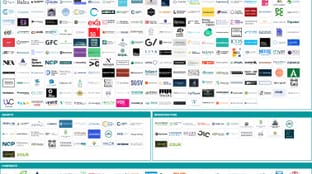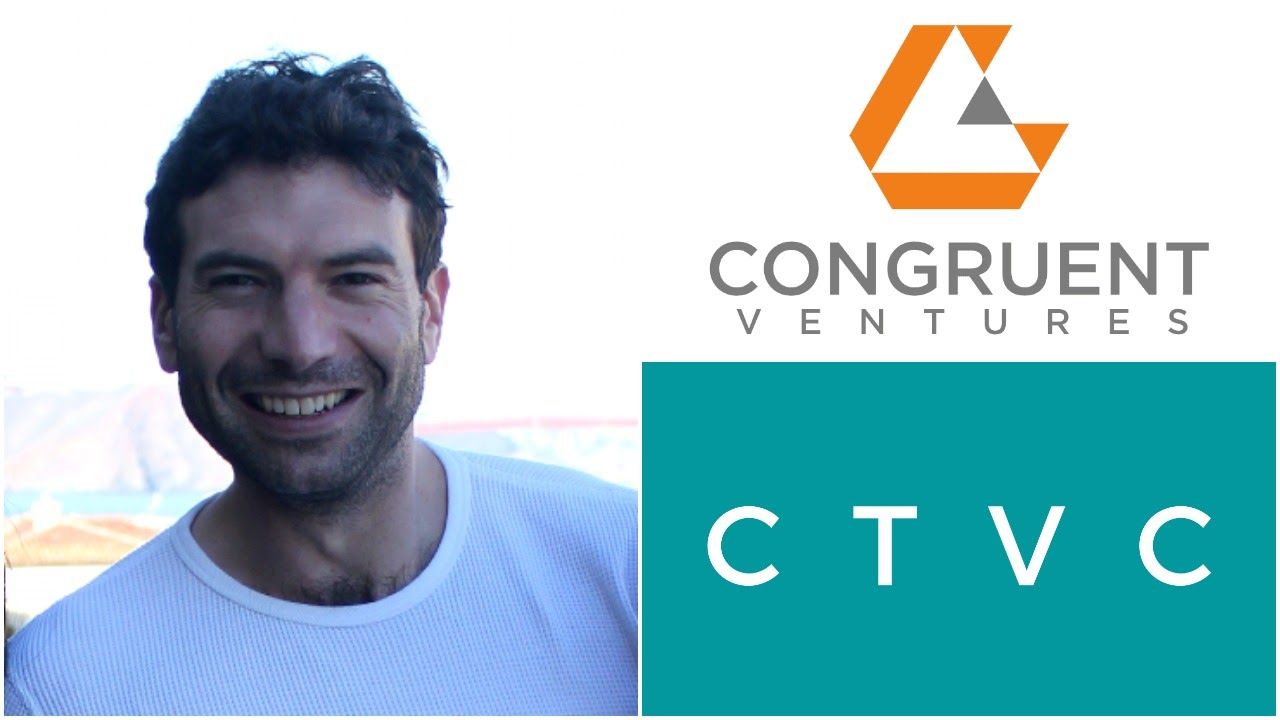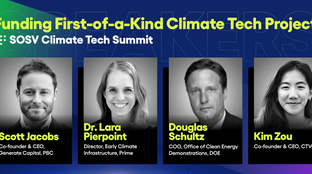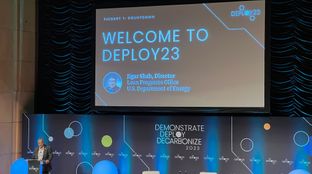
🌏 Who are the Climate Tech Investors?
A new interactive Climate Capital Stack Map
Weathering the climate tech winter and into the Great Climate Confluence

With a fresh $175m in the bank from an oversubscribed fundraise, Congruent Ventures is well positioned to support early stage climate tech founders through this supercycle. But it’s hardly just capital that sets Co-Founder and Managing Partner Abe Yokell apart, he hard earned the nomer of “cleantech venture OG” through the whiplash of the cleantech boom and winter - and is still standing, more enthusiastic and insightful than ever about investing in early stage climate tech. Abe is uniquely candid and charismatic about the journey from associate to emerging manager to fund II - and the North Star that lit his way.
You’re known as one of the cleantech venture OGs. What did you do to deserve this honor?
Probably the only real answer is that I stuck it out when everyone else left the building. I’ve been investing in what we now call climate tech since early 2004 when I joined RockPort Capital, which was one of the largest specialized cleantech venture firms. I worked at Rockport for over 13 years, including getting booted out of the Boston office to start our West Coast office in 2007. When 2008 hit we’d just raised a $450m fund (which was one of the larger climate vehicles), and it was an absolutely abysmal time in the sector as capital, companies, and talent evaporated. The tide stopped going out in the 2014-2015 timeframe, and it only just started to come back in again during the pandemic. So the “OG” nomer feels particularly relevant after sticking it out for over ten years.
Most of the original investors and operators in the sector weren’t able to make it through the cleantech doldrums - I was lucky that my wife was able to support us financially through that period. I couldn’t stomach not devoting my career to the thing that I thought that mattered most - even when the markets didn’t acknowledge it. And now it feels like we’re in that upswing again!
Were there any highlights along the way during the cleantech winter?
There weren’t too many, to be honest. Amongst the low lights, my North Star was always focusing my purpose on something that mattered beyond financial returns. For me, that has consistently been having an impact on climate change and the most effective tool to do so - though it has worked against us in many ways - is capitalism. Venture capital provides the opportunity to use this capitalist toolset to both support the entrepreneurial climate ecosystem while also producing top tier returns for our Limited Partners.
The asset allocators (LPs) had been quite enthusiastic about cleantech venture in 2005-2008 - then they ran howling for the hills after the 2008 financial crisis. One of the most destructive patterns to exhibit as a fund manager is to look like you're going to make your investors a great return, and then turn around and lose their capital. LPs had allocated heavily to cleantech, and then ended up recouping not 3x but half of their investments. After 2008, it was just absolute mayhem with senior partners departing and almost no new capital getting committed to new cleantech funds for many years.
The cleantech winter was mostly death by a thousand cuts, with a couple punches in the face mixed in. A visceral example of how this backdrop impacted all aspects of life; I was at my wife's holiday party in 2011 having a nice conversation with the wife of one of her colleagues’ who was running one of the top venture law firms in the Valley. She asked me what I did, and when I said “cleantech venture”, she goes, “Oh, I'm so sorry,” and walks away. That was literally the end of the conversation. Cleantech was toxic. And this is just a few years after getting dogpiled with inbound interest when I was recruiting for investment talent on business school campuses. Going from being in a desirable position to being the pariah was quite the whiplash.
So how did Congruent Ventures grow out of this?
In that 2015-2016 time period, the cleantech tide started to trickle back in. The bellwether was the pace of new company formation. I was fortunate to be at one of the very few funds that was still (somewhat) deploying dollars, so we’d get all of the inbounds. I realized that no institutional capital was serving those early stage founders and, frankly, the angel community was limited given there were few founders who had made money in the sector to recycle back into the ecosystem. I was digesting this dynamic and chatting with a couple folks about ideas for addressing the burgeoning early stage activity. And then Josh [Posamentier], and the Prelude [Ventures] team reached out. They saw the same lack of early stage capital, which was holding back the entire ecosystem. Prelude’s sweet spot was Series A and B and they recognized the lack of high quality institutional capital coming in at those Seed and early A stages - and they wanted to start a firm to focus on it.
Josh got buy-in from the Prelude team and their LPs, and we emerged with the idea for an early stage firm that ended up becoming Congruent. We took that conversation to UC, and alongside Prelude, they joined as our founding LPs to reboot investing in the early stage climate ecosystem. We’d started the fundraise for fund I targeting $30m, but it turned into a $42m Seed fund with another $50m behind that of effectively reserve capital. We recently closed our second fund at our hard cap with $175m of commitments on an original target of $125m, which we’re delighted about.
What’s Congruent’s investment framework for thinking about climate tech?
With all credit to our friends at a16z, our general view is that climate is eating the world. It’s everywhere and it’s in everything we do - how we move, how we eat, how we live. And so our aperture for investing is intentionally broad; anything that has a positive impact on the climate and resources is fair game. We invest in companies that we think can scale in a venture fashion and have a positive impact when they achieve that scale.
Our investments cut across four separate verticals: first in mobility, transportation in the built environment; second in the energy transition; third in food and agriculture from precision ag to downstream new food products; and our forth bucket is sustainable production and consumption. We cover a lot of ground with our investable areas and do it all: hard tech, deep tech, software, services, insurtech. Any business that can achieve venture scale and has climate impact at scale is fair game for us.
Are LPs demanding explicit impact metrics?
Some are. In fact, we’ve had to turn LPs down because of very precise - but not necessarily accurate - needs around reporting. Our general policy is to not obligate full impact metric reporting from our portfolio until companies have met a certain revenue threshold. Asking a three person team that has just filed their formation documents to put together an impact report is ludicrous. Even when companies are later-stage, our Congruent team tries to do the heavy lifting. In fact, we’re just about to publish our first impact report in the next couple of weeks.
Talk to us about the money behind the money. How do the LPs for fund II differ from fund I?
Backing up for a second, when we went out to raise fund I, LPs categorized us in the “emerging manager do not fly zone.” Most LPs do not want to back first time fund managers, and especially not fund managers who are working together for the first time. The Venn Diagram overlap of LPs who were interested in backing first time managers and those who care about climate was effectively zero. From that 2009-2017 time period, Congruent was probably the first emerging manager out of the gate with a pure sustainability fund. All of this made fundraising a fascinating exercise. We’re incredibly fortunate to have the solid backing of Prelude, UC, and Cambridge Associates and some of their clients.
The first fund closed in 2017 which felt like the tipping point of when climate change went from academia to impacting people’s lives. There has been an emotional realization that climate change is real, especially with the last four years of wildfires in California and abroad. Capital markets are really just a distillation of aggregate human emotions. The easiest proxy for this capital market attention is to look at ESG fund flow, which I view as an acknowledgement that the world is beginning to burn.
The fundraising environment has changed dramatically over the last four years, and in particular over the last year to the positive. It still probably isn’t a sufficient amount of capital to solve our climate challenges, but the trend is going the right way.
So you’re confident that there’s room for more capital to flow into the early stage investing space?
Way more room! We’re seeing big dollars moving into the bigger, later stage funds like TPG Climate. More capital is positive, but it’s not going to get the early stage tech solutions scaled in the market. There's a gap between growth and early stage capital.
How will emerging climate tech funds fit into what already feels like a crowded space? How will they differentiate?
We’re at the front end of what I think will be a real supercycle in our entire economic rewriting. Reasonably intelligent investors backing interesting entrepreneurs at the early stage, as a general cohort, are going to do well. Especially with the amount of talent flowing into the space at company formation - I've never seen anything like it, it’s awesome. Congruent is drowning in interesting deals, and we can't do them all. There’s room out there for many more Congruents. We're a long, long, long way from saturation to support this ecosystem.
The mainstream funds coming into the space are a huge positive, although the pricing discipline in our world has changed as a result of the new entrants. The challenge will be knowing when to break our discipline and when not to. But when you see companies that have breakout potential, then at the early stage the pricing discipline just doesn't matter as much.
What do people tend to get wrong about “what’s different this time” between Cleantech 1.0 and today?
The problem is that there is no silver bullet. The next wave of climate companies are lined up to succeed on the back of at least five different factors. If a few of these factors disappear, the system will be resilient, but if many fade at once, then we’re back to Cleantech 1.0. I call this the “Great Climate Confluence”:
What areas in climate tech have you the most excited at the moment?
There are so many things to talk about. One area I’ve been exploring is in the evolution of DERs (distributed energy resources) as renewables become cheaper. For those focused on the cost of renewables, the energy transition feels like it’s done, but the acceleration is just now beginning and utilities are figuring out how to face intermittent supply and flexible demand operationally. We’ve made bets on Leap, Blueprint Power, and Camus Energy on the distributed energy side and Fervo Energy as a source of baseload power around this theme.
Separately, a particularly difficult place to invest, but one that we’re nonetheless excited about is the application of climate data. We can use climate data to inform real world decisions, especially in the realm of wildfires, insurance, financials and physical asset allocation. AI and ML are now buzzwords, but can have rich applications in climate as well. AMP Robotics, which uses AI and computer vision to sort waste, is seeing tremendous growth because it’s a much better solution than the existing manual and mechanical sorting. [Read the CTVC interview with AMP Robotics CEO Matanya Horowitz.]
Have you noticed a difference in the type of entrepreneurs “working on climate”?
Definitely. There are positive differences across the board in the backgrounds, quantity, and quality of founders entering the space. In climate tech, there has always been an ethos of trying to use technology to effect positive change in the world. But for technologists in other sectors, there’s been a lot of disappointment on the impact side. Engineers building social networks are now facing a world of blame. The Valley talent that wakes up in the morning to have a positive impact through their work now wakes up in San Francisco and can’t see the sun through the smoke. It's a life changing moment. These people are now asking how they can use their skill sets to have an impact on climate.
Do you want to be in harmony with solving the biggest climate challenges at the earliest stages? Make sure to talk to Congruent if you’re starting a new climate company. Likewise, check out the 164 current open roles at existing Congruent portfolio companies.

A new interactive Climate Capital Stack Map

Financing around first- or early-of-a-kind project risk

‘Government-enabled, private sector-led’ in action in Washington, DC